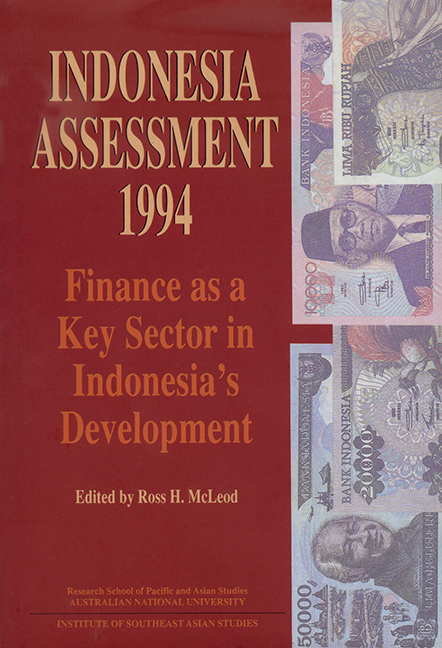Book contents
- Frontmatter
- Contents
- Tables, figures, appendices
- Foreword
- Glossary
- Contributors
- Acknowledgements
- 1 Introduction
- PART A ECONOMIC AND POLITICAL DEVELOPMENTS
- PART B FINANCE AS A KEY SECTOR IN INDONESIA'S DEVELOPMENT
- I The Reform Process
- II Monetary and Exchange Rate Policy
- III Banking Sector Reforms
- IV Domestic and International Capital Markets
- V Small-scale Finance
- 16 Small-scale finance: lessons from Indonesia
- 17 The cooperative rural finance program in Indonesia
- References
- Index
17 - The cooperative rural finance program in Indonesia
from V - Small-scale Finance
Published online by Cambridge University Press: 21 October 2015
- Frontmatter
- Contents
- Tables, figures, appendices
- Foreword
- Glossary
- Contributors
- Acknowledgements
- 1 Introduction
- PART A ECONOMIC AND POLITICAL DEVELOPMENTS
- PART B FINANCE AS A KEY SECTOR IN INDONESIA'S DEVELOPMENT
- I The Reform Process
- II Monetary and Exchange Rate Policy
- III Banking Sector Reforms
- IV Domestic and International Capital Markets
- V Small-scale Finance
- 16 Small-scale finance: lessons from Indonesia
- 17 The cooperative rural finance program in Indonesia
- References
- Index
Summary
Introduction Policy makers in Indonesia have placed great emphasis on the provision of credit to small-scale entrepreneurs in farming, manufacturing and trade. This has led to government interventions (often supported by donors) such as nationwide targeted credit programs, the establishment of specialised development finance institutions, and numerous credit projects providing cheap loans to specific groups in particular locations. Few of the institutions, programs or projects have been too successful if measured by their ability to provide credit on a continuous basis at a cost affordable to government or donor. This experience is not unique to Indonesia, however, as there is a worldwide persistent lack of success of similar interventions aimed at providing subsidised credit to small entrepreneurs.
The universally negative experience with subsidised, targeted credit, and the massive amount of government funds involved, triggered a global debate. Initially the analysis focused on the consequences of intense government interference in interest rate determination and lending policies for the effectiveness and viability of financial institutions. The rise and fall of subsidised, targeted credit programs has been extensively analysed (e.g. Von Pischke et al. 1983). The discussion has since broadened to include the performance of the financial sector overall and the specific characteristics of credit transactions in rural financial markets (Hoff and Stiglitz 1990; Besley 1994).
The new insights gained resulted at the macro level in a more favourable attitude towards financial liberalisation and a redefinition of the government's role—away from participation and intervention and towards providing a climate in which banks can perform their task as intermediaries in channelling funds from savers to investors, guided by market forces. At the micro level, there is a growing realisation among policy makers that small entrepreneurs are not well served by credit programs which operate for a few years; rather, they require permanent access to financial services. These can only be provided by financial institutions that combine the original focus of projects and programs on small entrepreneurs with the basic objective of all banks: financial viability, expressed in the capability to mobilise funds and to provide credit services profitably.
- Type
- Chapter
- Information
- Indonesia Assessment 1994Finance as a Key Sector in Indonesia's Development, pp. 314 - 333Publisher: ISEAS–Yusof Ishak InstitutePrint publication year: 1994

